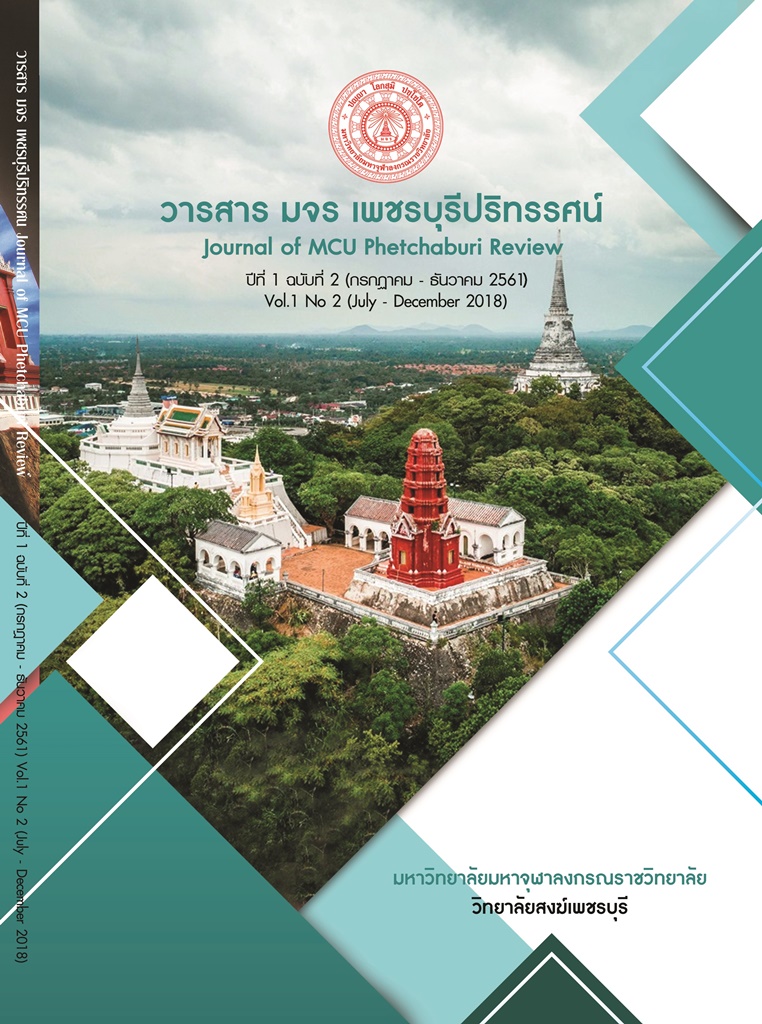REGARDING THE STYLE OF GOVERNMENT
Main Article Content
Abstract
A local government organization is a grassroots local administration unit closely related to the local people directly representing the local people. That serves as a mouthpiece for the people in the area. It is essential to manage local affairs because it is one way to reduce the central state's authority. It also strengthens the regional power. The Constitution of the Kingdom of Thailand, B.E. 2550 (2007) stipulated guidelines and policies for the administration of the State affairs in Article 78 that the State must decentralize the local government organization to be self-reliant and to make decisions on local matters by itself and promote Let the local government organization participate in the implementation of the basic state policy. Develop local economy Public utilities and other utilities, etc. It can be seen that the Constitution of the Kingdom of Thailand has a direction to decentralize power to local government organizations. By empowering Local government organization Reduced central state powers Create transparency, in a meaningful way, to increase the right to participate More local government To be the basis for the development of democracy That will continue to be strong at the national level Currently, the law prescribes that there are two types of local government organizations: general form. And particular forms, which 1) the available form is the provincial administrative organization, municipality and Subdistrict Administrative Organization which, according to the Act, sets plans and procedures Decentralization for you Local Administrative Organization B.E.
Article Details
References
ประภาส ปิ่นตบแต่ง. (2552). กรอบการวิเคราะห์การเมืองแบบทฤษฎีขบวนการทางสังคม. เชียงใหม่: มูลนิธิไฮน์ริคเบิลล์สํานักงานภูมิภาคเอเชียตะวันออกเฉียงใต้.
พระมหาสุทิตย์ อาภากโร. (2547). เครือข่าย ธรรมชาติ ความรู้ และการจัดการ. กรุงเทพมหานคร: โครงการเสริมสร้างการเรียนรู้เพื่อชุมชนเป็นสุข.
ระดม วงษ์น้อม. (2527). แนวความคิดเกี่ยวกับชนชั้นนำและการศึกษาโครงสร้างอำนาจชุมชน. กรุงเทพมหานคร: มหาวิทยาลัยธรรมศาสตร์.
ราชบัณฑิตยสถาน. (2524). พจนานุกรม ศัพท์สังคมวิทยา อังกฤษไทย. พระนครศรีอยุธยา: โรงพิมพ์รุ่งเรืองศิลป์การพิมพ์.
วิทยา นภาศิริกุลกิจ เเละสุรพล ราชภัณฑารักษ์. (2537). พรรคการเมืองและกลุ่มผลประโยชน์. กรุงเทพมหานคร: โรงพิมพ์มหาวิทยาลัยรามคําแหง.
สุจิต บุญบงการ. (2519). อำนาจทางการเมืองของผู้นำทหารไทย. ใน สมบัติ จันทรวงศ์ และรังสรรค์ ธนะพรพันธุ์ (บรรณาธิการ). รักเมืองไทย: ภาคประวัติศาสตร์และการเมือง. กรุงเทพมหานคร: สมาคมสังคมศาสตร์แห่งประเทศไทย.
Blau, P. M. (1964). Exchange and Power in social life. New York: Wiley.
Chantarasorn, W. (2000). Theory of policy implementation. Bangkok: Sahay Box Press.
Chantarasorn, W. (2013). Theory of public policy practice. (6th ed). Bangkok: Pek-Wan Graphic.
Chayabuth, C. (1996). Thai local government. (3rd ed). Bangkok: Pikaneth Press.
Chumak, S. (2015). Current International Relations (1990s) to the First decade of the 21st century. Bangkok: Chulalongkorn University Press.
Easton, D. (1957). An Approach to the Analysis of Political System. World Polities, 9(3), 383-400.
Mahood, H. R. (1990). Interest Group Politics in America, A new Intensity. Englewood, Cliffs, N.J.: Prentice Hall.
Michaels, R. (1968). Political Parties. New York: Colier Books.
Mosca, G. N. (1939). The Ruling Class. New York: McGraw-Hill.
Smith, M. J. (1993). Pressure power and policy, State autonomy and policynetwork in Britain and the United States. New York: Harvester Wheatsheaf.
Wootton, G. (1970). Interest Groups. Engle-Wood Cliffs, N.J.: Prentice-Hall Inc.


